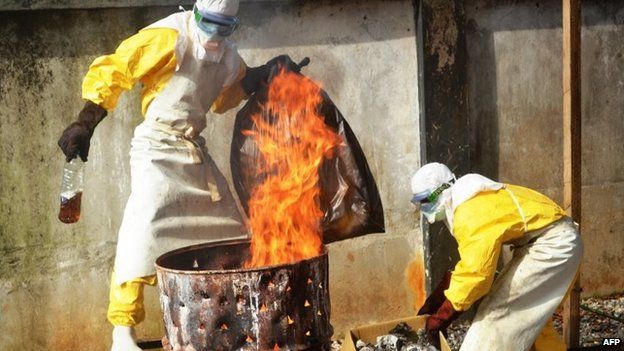Ebola outbreak: UN calls for $1bn to fight virus
- Published

More than $1bn (£618m) is needed to fight the West Africa Ebola outbreak, which is a health crisis "unparalleled in modern times", UN officials say.
The spread of the disease means the funds needed to fight the outbreak have increased ten-fold in the past month, the UN's Ebola co-ordinator said.
Ebola has killed 2,461 people this year, about half of those infected, the World Health Organization said.
There has been criticism of the slow international response to the epidemic.
The outbreak began in Guinea before spreading to its neighbours Sierra Leone and Liberia.
Nigeria and Senegal have reported some cases, but seem to have contained the transmission of the virus.
'Massive surge needed'
"We requested about $100m a month ago and now it is $1bn, so our ask has gone up 10 times in a month," the UN's Ebola co-ordinator, David Nabarro, told a briefing in Geneva.
"Because of the way the outbreak is advancing, the level of surge we need to do is unprecedented, it is massive."
At the same briefing, World Health Organization (WHO) deputy head Bruce Aylward announced the latest Ebola case figures.
The virus has infected at least 4,985 people so far, with about half of those infected dying.
"Quite frankly, ladies and gentlemen, this health crisis we're facing is unparalleled in modern times. We don't know where the numbers are going on this," he said.
Ebola deaths
Figures up to 13 January 2016
11,315
Deaths - probable, confirmed and suspected
(Includes one in the US and six in Mali)
-
4,809 Liberia
-
3,955 Sierra Leone
-
2,536 Guinea
-
8 Nigeria
When the WHO had said it needed the capacity to manage 20,000 cases two weeks ago "that seemed like a lot", Dr Aylward said.
"That does not seem like a lot today," he added.
US President Barack Obama is expected to announce plans to send 3,000 American troops to Liberia, one of countries worst affected by the outbreak, to help fight the virus.
Officials say the troops will build 17 health care centres, each with 100 beds, deliver health care kits to hundreds of thousands of homes and help train 500 health workers a week.
Infected 'turned away'
Medical charity Medecins Sans Frontieres (MSF) called on other countries to follow the US lead as the response to outbreak continued to fall "dangerously behind".
At the Ebola briefing, MSF president Joanne Liu said there needed to be "co-ordinated response, organised and executed under clear chain of command".
"The window of opportunity to contain this outbreak is closing," she said. "We need more countries to stand up, we need greater deployment, and we need it now."
Sick people in the Liberian capital were banging on the doors of MSF Ebola care centres desperate for a safe place in which to be isolated, she said.
"Tragically, our teams must turn them away; we simply do not have enough capacity for them," Dr Liu said.
"Highly infectious people are forced to return home, only to infect others and continue the spread of this deadly virus. All for a lack of international response."
Earlier on Tuesday, the WHO welcomed China's pledge to send a mobile laboratory team to Sierra Leone, which will include epidemiologists, clinicians and nurses.
"The most urgent immediate need in the Ebola response is for more medical staff," WHO head Margaret Chan said in the statement.
Ebola virus disease (EVD)
- Symptoms include high fever, bleeding and central nervous system damage
- Spread by body fluids, such as blood and saliva
- Current outbreak has mortality rate of about 55%
- Incubation period is two to 21 days
- There is no proven vaccine or cure